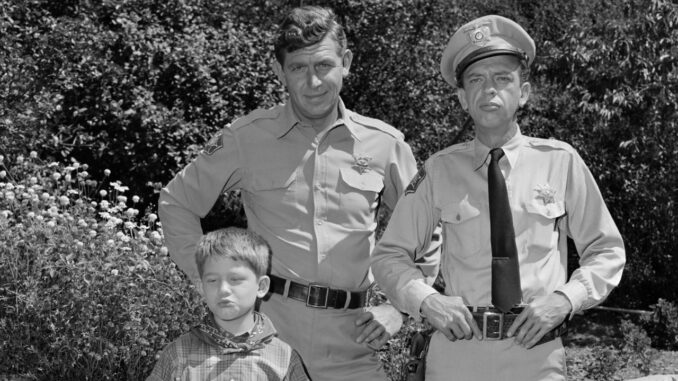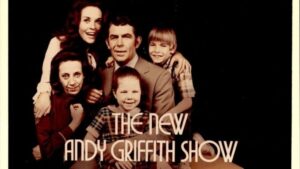
Introduction: A Master Class in Classic Cinema
When you think of Ron Howard, the first thing that comes to mind is perhaps his iconic roles in The Andy Griffith Show or Happy Days. But did you know that behind his directorial genius lies a true passion for classic cinema? His admiration for Andy Griffith’s work is well-known, but Howard’s taste in movies extends to an often-overlooked genre—film noir. This article takes a deep dive into Ron Howard’s classic cinema picks, especially his tribute to the legendary Andy Griffith, and explores how the timeless allure of film noir plays into his cinematic influence.
The Timeless Influence of Andy Griffith on Ron Howard
A Bond Like No Other: The Andy Griffith Legacy
For Ron Howard, working with Andy Griffith was more than just a job—it was a formative experience that shaped his career. Griffith’s portrayal of Sheriff Andy Taylor on The Andy Griffith Show became an enduring symbol of wisdom, kindness, and the quiet strength of small-town life. Howard, who played the young Opie Taylor, has often spoken about the powerful lessons he learned from Griffith, not only as an actor but as a person.
How Andy Griffith’s Legacy Echoes in Ron Howard’s Career
Howard’s admiration for Griffith goes beyond their shared screen time. Ron Howard’s career as a director has often been influenced by the subtle storytelling and deep character exploration that Griffith brought to The Andy Griffith Show. In many ways, Howard’s approach to filmmaking mirrors Griffith’s own calm, thoughtful demeanor, even when dealing with high-stakes situations.

Film Noir: The Dark and Timeless Artform
What is Film Noir? A Look into the Shadows
Film noir is a genre that emerged in the 1940s and 1950s, defined by its dark, moody atmosphere, morally ambiguous characters, and intricate, suspenseful plots. These films often dealt with themes of crime, betrayal, and existential despair. It’s no surprise that Ron Howard, with his love for character-driven narratives, has developed a fascination with this genre.
Why Film Noir Still Matters Today
Despite the passage of time, the core elements of film noir still resonate with modern audiences. Its focus on flawed, complex characters and the exploration of human nature speaks to timeless themes. Whether it’s the morally compromised private investigator or the femme fatale, film noir continues to shape storytelling today.
Ron Howard’s Film Noir Picks: A Tribute to the Golden Age of Cinema
The Influence of Classic Noir on Ron Howard’s Direction
Ron Howard’s directorial style is deeply influenced by classic cinema, including film noir. His films, such as A Beautiful Mind and Cinderella Man, explore complex characters who face immense personal challenges, much like the protagonists of noir films. Howard has often cited the power of noir’s visual style, its dark lighting, and its deep, psychological storytelling, as key influences on his work.
Ron Howard’s Favorite Noir Films: A Curated List
Here are a few classic film noir films that Ron Howard has often referred to as some of his all-time favorites:
- “Double Indemnity” (1944): Directed by Billy Wilder, this film is often considered the epitome of film noir. With its hard-boiled dialogue and an unforgettable performance by Barbara Stanwyck, it’s a prime example of the genre’s bleak moral universe.
- “The Big Sleep” (1946): Starring Humphrey Bogart and Lauren Bacall, this film is a complex web of crime, corruption, and romantic tension. Its intricacies and dark mood are something Howard deeply admires.
- “Out of the Past” (1947): Another noir classic that explores themes of fate, betrayal, and the past’s inescapable grip. Its reflective and melancholic tone has often been cited by Howard as an example of powerful narrative construction.
- “The Maltese Falcon” (1941): With a strong emphasis on character development and intricate plot twists, this film is one of the most influential noirs ever made. Howard’s own films often share these traits, weaving compelling characters into complex, unpredictable stories.
The Connection Between Andy Griffith’s Warmth and Noir’s Darkness
Opposites Attract: A Fascinating Contrast
At first glance, Andy Griffith’s wholesome, down-to-earth image as Sheriff Taylor seems worlds apart from the cynical, often fatalistic world of film noir. However, it is this very contrast that makes Ron Howard’s admiration for both so compelling. The warmth and simplicity that Griffith brought to The Andy Griffith Show provides a perfect counterbalance to the shadows and moral ambiguity of film noir.
Griffith’s Influence on Howard’s Approach to Noir
Howard has a unique way of combining the goodness and clarity of his early career with the complexity and darkness of noir. It’s as though he’s learned from Griffith’s portrayal of goodness and innocence in a complicated world and adapted those lessons into his noir-inspired films, resulting in a distinctive storytelling style that balances light and shadow.
Ron Howard as a Storyteller: Weaving Noir into Modern Filmmaking
Film Noir’s Legacy in Howard’s Recent Films
While Ron Howard’s films might not always fall directly into the noir category, elements of the genre are still evident. In The Missing, Frost/Nixon, and Rush, Howard explores moral dilemmas, personal betrayals, and characters caught in life-altering situations. These themes are central to the ethos of film noir.
The Role of Noir’s Cinematic Techniques in Howard’s Filmmaking
Ron Howard has also adopted many of the cinematic techniques that defined film noir, particularly its use of shadows and high-contrast lighting. These techniques heighten tension and emphasize the psychological aspects of the characters’ journeys, much like they do in the classic noirs of the ’40s and ’50s.
The Enduring Power of Classic Cinema in the Modern World
Timeless Stories in a Changing World
Despite the shift in filmmaking trends, classic films, including noir, continue to influence modern filmmakers like Ron Howard. The raw emotions and intricacies explored in noir films still resonate with audiences today, proving that the themes of love, betrayal, and justice transcend time.
The Lasting Legacy of Andy Griffith and Film Noir
In many ways, Ron Howard’s love for Andy Griffith and film noir reflects his respect for storytelling that transcends eras. Griffith’s warm portrayal of Andy Taylor and the brooding, gritty world of noir both remain pivotal to his artistic identity. These influences ensure that, regardless of the genre, Ron Howard will continue to create films that resonate deeply with audiences for generations to come.
Conclusion: A Love Letter to Classic Cinema
Ron Howard’s tribute to Andy Griffith and his passion for film noir showcase his deep appreciation for timeless storytelling. Whether it’s the pure, sincere goodness of Griffith’s portrayal of Andy Taylor or the complex, morally ambiguous characters of film noir, Howard’s cinematic influences are as diverse as they are profound. His ability to merge these influences into his own work is a testament to his mastery as a storyteller and his enduring respect for classic cinema.
FAQs
1. How did Ron Howard’s relationship with Andy Griffith influence his filmmaking?
Ron Howard’s relationship with Andy Griffith shaped his approach to acting and directing, particularly in his respect for character-driven stories and moral clarity in storytelling.
2. What makes film noir such an influential genre for filmmakers today?
Film noir’s deep exploration of human flaws, its morally complex characters, and its use of shadowy cinematography have had a lasting impact on modern storytelling, including Ron Howard’s films.
3. What are some of the key features of film noir that Ron Howard incorporates into his work?
Ron Howard incorporates themes of betrayal, moral ambiguity, and psychological depth into his films, often utilizing high-contrast lighting and intricate plot development, hallmark elements of noir.
4. Does Ron Howard consider Andy Griffith’s influence when making darker films like A Beautiful Mind?
Yes, Ron Howard often balances the warmth and clarity inspired by Andy Griffith with the darker, more complex themes of film noir to create compelling narratives.
5. Can modern audiences still connect with the themes of film noir?
Absolutely. Film noir’s exploration of timeless themes like human flaws, corruption, and justice continues to resonate with contemporary audiences, making it an evergreen genre.